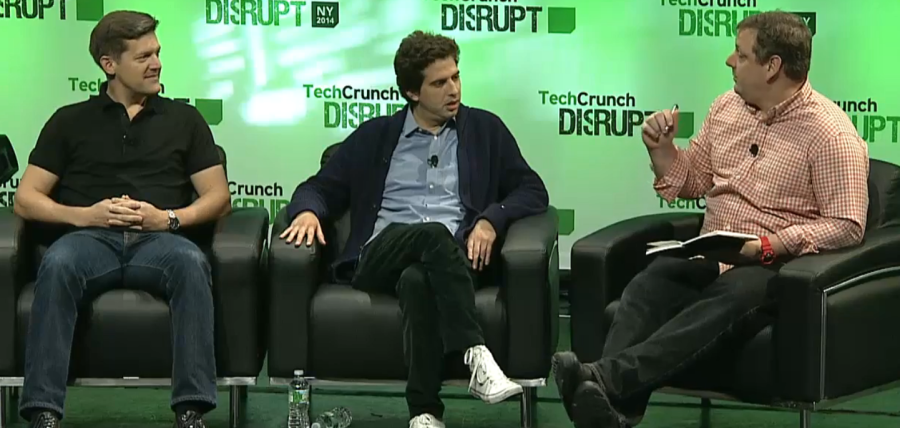
On the last day of TechCrunch Disrupt New York, Michael Arrington sat down with Whisper CEO Michael Heyward and Sequoia Capital partner Roelof Botha. What was supposed to a normal “Tell us about Whisper” interview turned into a heated debate. There has already be a ton written about the exchange between Arringon and Heyward, but I think a lot of it misses the point. I didn’t seem at all like Heyward melted down, or crashed and burned. Instead, at least in my opinion, it seemed that Heyward was trying to rectify a widely held fundamental misunderstanding about his company, a misunderstanding that Arrington was unwilling to acknowledge or move away from.
The chat began tamely enough, with Arrington asking Heyward about the mission and goals of Whisper. Whisper, argued Heyward, is about much more than concealing identity. Rather, the goal of Whisper is to make the world a more caring an empathetic place. Anonymity is a means to this end. By creating a platform that strips away individual identity, Whisper helps facilitate more a more meaningful and more open exchange of ideas. Herein lies the cause of the heated exchange.
"Gwyneth Paltrow is cheating on Chris Martin With entertainment lawyer Kevin Yorn (You heard it here first)" #whisper pic.twitter.com/dP9TcPqYO4
— Whisper (@WhisperApp) February 18, 2014
Arrington asked how could that mission of creating a more caring and empathetic world be rectified with the above Whisper post. Heyward became noticeably agitated, but proceed to make a sound, logical argument. I think the biggest factor that influenced nearly every other piece about the exchange was the fact that Heyward’s answer was incredibly long-winded and broken up by several interruptions from Arrington. However, if you look at the totality of Heyward’s argument it makes a lot of sense.
Essentially, Heyward argued that Whisper, in pursuit of the above mission, strives for truth and honesty. Often, truth can be quite nasty. Therefore, it only makes sense that they publish the nasty truths alongside the good. Heyward then went into the censorship and moderation. There is a clear line between individual, normal users and those in the public sphere. Whisper allows zero proper names, except in the case of these public figures. Heyward pointed out that Whisper has a strict set of internal guidelines and and every post about public figures is thoroughly vetted. Lest we forget, the post was indeed true.
Botha, in what was really the only chance he got to speak during the Whisper debate, made a really insightful comment on the situation. The integrity of a person, organization, company, app, or whatever, Botha argued, has a lot to do with being truthful. Little white lies have a snowball effect. Whistle-blowing, Botha continued, plays a major part in maintaining integrity. It is not by mistake that NASDAQ and other markets require companies to have whistleblower hotlines and other safeguards in place. It is in the public good for negative things to by put out in the open, Botha concluded.
Though, certainly, leaks about celebrities are not the same as, say, the NSA leaks, they are in the same vein. If someone makes their living solely off of their public perception, it is in the public’s interest to know the truth. Though these sort of celebrity scandals are a bit petty, it comes with the territory. Whisper was built for truth. Just because you don’t like it, or the subject matter may be taboo, it doesn’t make it less true. I am struggling to find any fault with such a post.

